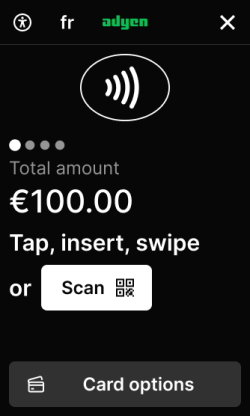Some cards allow transactions to be routed through different payment networks. For example:
- Co-badged cards. In many cases, these support a local card scheme for domestic payments and a global card scheme for international payments. For example, Australian cards with eftpos and Visa or Mastercard, or Belgian cards with Bancontact and Maestro. There are also prepaid cards in combination with a global card scheme. Adyen offers a way for shoppers to select their application in accordance to regulations for co-badged cards issued in the European Economic Area
- Combo cards, which support both credit and debit payments.
- US debit cards that support both a "front-of-card" global debit network like Visa, Mastercard, or Discover, and one or more "back-of-card" US Debit networks like Accel, NYCE, or PULSE.
You could say such cards have multiple payment methods. In the financial industry, we say the card has multiple applications.
Requirements
| Requirement | Description |
|---|---|
| Integration type | A Terminal API integration with payment terminals, or a standalone solution . |
| Setup steps | Before you begin:
|
Automatic application selection
When the shopper presents a card with multiple applications, the payment terminal can ask the shopper to select one. However, this manual selection process takes time and can confuse the shopper. Also, the outcome may not be in your best interests. Therefore, we try to select an application automatically and prevent having to show the manual selection screen.
To automatically select an application, we apply some checks:
- Does the terminal support the application?
- Does the terminal support the transaction type for the application?
- Are there currently any issues with the availability of the application's payment network?
We also apply some rules:
- Rules resulting from the payment request. For example, installment payments must be routed over a credit network. So when the payment request is for installments and the shopper presents a combo card, we select the credit application.
- Scheme compliance rules with regard to showing the manual selection screen.
- Least cost routing rules that most of our merchants prefer.
Least cost routing
The interchange fees and scheme fees you pay for a transaction differ depending on the payment network that the transaction is routed to. In general, transactions processed over a local payment network are cheaper. On the other hand, some global networks charge lower fees for specific businesses.
Another consideration is whether the fee is fixed or based on a percentage of the transaction value. The next example shows that either type of fee can be cheaper, depending on the average transaction value.
| Average transaction value | Fixed fee | Percentage fee |
|---|---|---|
| USD 50 | USD 0.15 | 1% = USD 0.50 |
| USD 10 | USD 0.15 | 1% = USD 0.10 |
To route transactions over the payment network that results in the least costs in your particular situation, we can customize some of the automatic application selection rules.
Customizing application selection rules
In your Customer Area under In-person payments > Terminal settings > Payment features > Card application selection we show the application selection rules for your account, in the priority that we apply them.
We cannot change the rules that depend on compliance or supported features. But we can add or remove some of the other rules and change the priority. Reasons for customization are:
- Least cost routing: use a card network that results in the lowest fees in your situation.
- PIN verification: use an application that doesn't require a PIN. This can depend on the transaction value.
- Manual selection screen: make sure this screen doesn't appear when the shopper swipes a card, or when the shopper uses a contactless or contact chip card.
To customize application selection rules, contact our Support Team or your Adyen account manager.
Manually selecting an application
In accordance with the Multilateral Interchange Fee (MIF) Regulation, the shopper must be able to prevent automatic application selection for a particular transaction.
Also, the EU IFR Regulation 2015/751 article 80 for co-badged cards issued in the European Economic Area (EEA) requires that if a cardholder uses a co-badged card, and you support both brands, you must let them choose the brand to pay with.
Use terminal software version 1.109 or later to ensure that you are compliant with the regulations for co-badged cards issued in the EEA.
Manual application selection is also useful for offline payments when the local payment method doesn't accept offline payments and the global card scheme does.
To manually select an application, instruct the shopper to:
- When the payment terminal shows the payable amount, select the Card options button.
- Present their card.
- Select the card brand they want to pay with.
- Optionally, present their card again if necessary.
If the shopper presents their payment card without selecting the Card options button, the transaction continues using the default card brand.

Payment screen with Card option button.